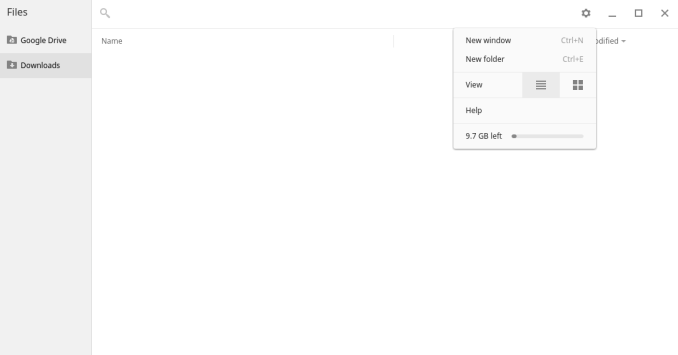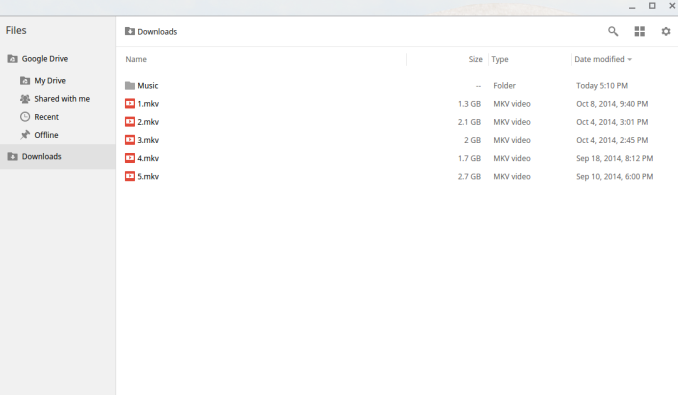Upgrading the SSD in Chromebook & MyDigitalSSD Super Boot Drive M.2 2242 SSD Review
by Kristian Vättö on October 21, 2014 8:00 AM ESTManaging Storage in Chrome OS
Chrome OS behaves a lot like iOS and Android when it comes to file management. While other computer-level operating systems like Windows and OS X give the user full access to system files, Chrome OS only provides very basic file management options.
The user access is limited to 'Google Drive' and 'Downloads' folders, and out of these two Downloads is the only truly local folder since Google Drive relies on cloud storage (although it does have offline functionality too). There is no way to create additional folders (or at least I could not find a way), so if you want to store something locally, it must be stored in the Downloads folder.
The 16GB SSD has about 9.7GB left with the operating system installed, so there is certainly not much room for offline storage in the default configuration. With the 256GB SSD installed, the free space increases to about 204GB, although I am not sure where the remaining ~46GB has gone.
Fortunately, it is possible to create folders inside the Downloads folder, so you can at least have some level of organization for local files. Chrome OS has integrated audio and video playback software (even MKV files are supported!) that can be used to play back local files, but especially the audio player is very limited and does not have support for playlists or other more sophisticated features. It works, but the user experience is much better if you have an Internet connection and use Google's web-based Play Music.
Anyway, there is not much to say about Chrome OS' file management. It is very limited and not user friendly for someone who is used to using Windows or OS X, but if you can work around the limitations it can be usable even with a larger internal drive. As far as performance testing under Chrome OS, there isn't much to be done; the MyDigitalSSD Super Boot Drive feels a bit faster on some tasks, but Chrome OS doesn't tend to hit storage much so the performance benefits aren't the primary reason to upgrade. But let's look at performance with the original and upgrade SSDs using our standard storage tests.












67 Comments
View All Comments
nevertell - Tuesday, October 21, 2014 - link
Could you do a review with putting Arch Linux or any other linux distribution and see how well that would fare on a cheap notebook such as this ?Nvidia is claiming to provide proper drivers for their tegra k1 this time around and it might be interesting to see how well a 'desktop' OS would fare on an arm chromebook.
kpb321 - Tuesday, October 21, 2014 - link
I agree. Putting more storage in a Chromebook doesn't make sense for exactly what the article found. The Chrome OS isn't designed around using local storage. Generally, you can't install windows on these machines because their bios doesn't support everything windows needs but ChrUbuntu or Crouton are designed to installed linux on this type of machine and a larger SSD might actually be useful then.danjw - Tuesday, October 21, 2014 - link
For any future M.2 drive reviews, I would suggest you include in the specs grid what the keying is SATA, PCIE or both.BackInAction - Tuesday, October 21, 2014 - link
"Chromebooks are generally the cheapest laptops around, yet if you buy a Windows laptop that costs twice as much you will most likely end up with a traditional hard drive for storage. That is an enormous benefit that Chromebooks have because the lack of a hard drive enables much thinner and lighter designs, which translates into a better user experience."While I believe "better/thinner/lighter" inexpensive windows devices are on their way. This is one of the top benefits of CB over $300 Win laptop. That and the fact that I have no worries about AV and/or software updates.
I own an 2nd gen i3 Win7 desktop, 2nd gen i3 Win7 laptop and a chromebook (Toshiba 13). Until I swapped out the HD on the laptop with a $50 SSD, it was nearly worthless. That said it is still a "tank" compared to the chromebook.
andrewaggb - Tuesday, October 21, 2014 - link
Agreed. I have two first gen I7 laptops and I had to put SSD's in both. Night and day difference. Went from buyers remorse to completely satisfied.LostAlone - Thursday, October 23, 2014 - link
There's obviously fewer worries with a chrome book, but massively reduced functionality too. Chrome books are really awesome for what they are, but is so very hard to recommend them to anyone simply because you don't have the rich application support you have on a full OS. People always seem to think that they browse the web and nothing else, but missing desktop games makes it feels like such a compromise.People need to know for sure that a chrome book will give them exactly what they want when they buy it. That's why it's uptake has stayed so low. Normal human beings aren't so keen because having no local storage and no music player is pretty tough to handle. IT deparments on the other hands go nuts over them because it's the perfect 'work and work alone' kind of machine that is both cheap to replace and with much less scope for things to go wrong.
But in todays world, I'd either spend more and get an MS Surface, or stick with a crappy old laptop because at least I can play Diablo on it.
LoneWolf15 - Tuesday, October 21, 2014 - link
I have used two MyDigitalSSD mSATA drives for some time, a first-gen 128GB and a second-gen 256GB. For anyone concerned about longevity, you needn't be. I got both at release time for each drive, and they are highly reliable. One is in my home theater PC now on an mSATA<->SATA conversion card, and one is in my ThinkPad. At their competitive prices, I'd gladly use them again.Walkop - Tuesday, October 21, 2014 - link
Could the drop in read performance be due to the fact that one of the storage packages within the SSD was filled up before the other…?Dr.Neale - Tuesday, October 21, 2014 - link
Interesting article, illuminates pros and cons of Chrome OS nicely.But I noticed a tiny typo in "Managing Storage in Chrome OS": In the first sentence, the phrase "when it comes file management" should read "when it comes to file management". (Just trying to help to perfect the piece!)
Kristian Vättö - Tuesday, October 21, 2014 - link
Good catch, fixed!